Feminist Critique of International Law
VerifiedAdded on 2021/04/26
|11
|3379
|77
AI Summary
The provided document explores the relationship between feminism and international law. It discusses how feminist theories have been applied to international law, with a focus on the trafficking protocol and refugee law. The assignment also touches on the concept of 'feminist jurisprudence' and its potential to reform the world vision of women's lives and thereby change international law borders. The document references various sources, including books and articles by scholars such as Charlesworth, Chinkin, and Mackinnon.
Contribute Materials
Your contribution can guide someone’s learning journey. Share your
documents today.
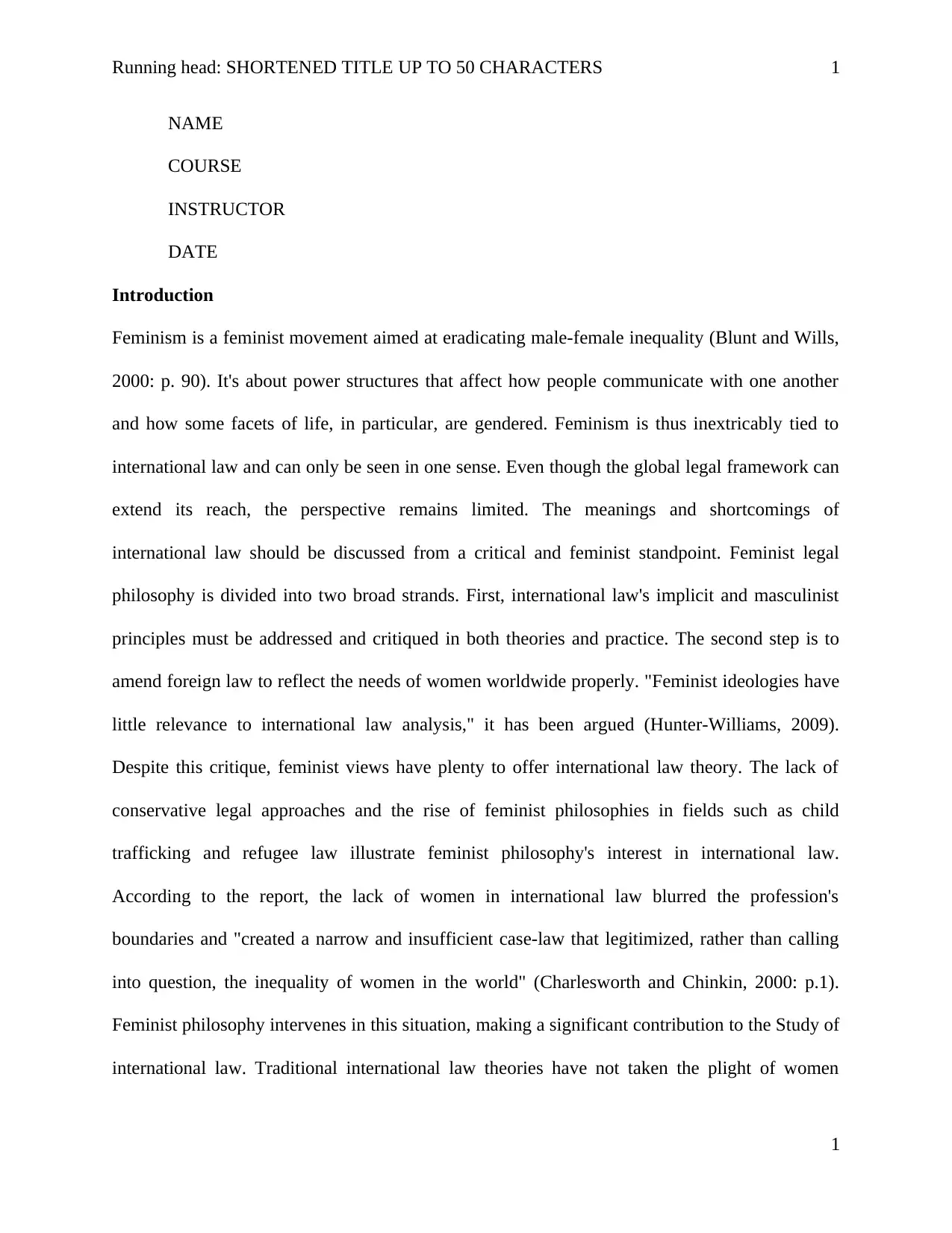
Running head: SHORTENED TITLE UP TO 50 CHARACTERS 1
NAME
COURSE
INSTRUCTOR
DATE
Introduction
Feminism is a feminist movement aimed at eradicating male-female inequality (Blunt and Wills,
2000: p. 90). It's about power structures that affect how people communicate with one another
and how some facets of life, in particular, are gendered. Feminism is thus inextricably tied to
international law and can only be seen in one sense. Even though the global legal framework can
extend its reach, the perspective remains limited. The meanings and shortcomings of
international law should be discussed from a critical and feminist standpoint. Feminist legal
philosophy is divided into two broad strands. First, international law's implicit and masculinist
principles must be addressed and critiqued in both theories and practice. The second step is to
amend foreign law to reflect the needs of women worldwide properly. "Feminist ideologies have
little relevance to international law analysis," it has been argued (Hunter-Williams, 2009).
Despite this critique, feminist views have plenty to offer international law theory. The lack of
conservative legal approaches and the rise of feminist philosophies in fields such as child
trafficking and refugee law illustrate feminist philosophy's interest in international law.
According to the report, the lack of women in international law blurred the profession's
boundaries and "created a narrow and insufficient case-law that legitimized, rather than calling
into question, the inequality of women in the world" (Charlesworth and Chinkin, 2000: p.1).
Feminist philosophy intervenes in this situation, making a significant contribution to the Study of
international law. Traditional international law theories have not taken the plight of women
1
NAME
COURSE
INSTRUCTOR
DATE
Introduction
Feminism is a feminist movement aimed at eradicating male-female inequality (Blunt and Wills,
2000: p. 90). It's about power structures that affect how people communicate with one another
and how some facets of life, in particular, are gendered. Feminism is thus inextricably tied to
international law and can only be seen in one sense. Even though the global legal framework can
extend its reach, the perspective remains limited. The meanings and shortcomings of
international law should be discussed from a critical and feminist standpoint. Feminist legal
philosophy is divided into two broad strands. First, international law's implicit and masculinist
principles must be addressed and critiqued in both theories and practice. The second step is to
amend foreign law to reflect the needs of women worldwide properly. "Feminist ideologies have
little relevance to international law analysis," it has been argued (Hunter-Williams, 2009).
Despite this critique, feminist views have plenty to offer international law theory. The lack of
conservative legal approaches and the rise of feminist philosophies in fields such as child
trafficking and refugee law illustrate feminist philosophy's interest in international law.
According to the report, the lack of women in international law blurred the profession's
boundaries and "created a narrow and insufficient case-law that legitimized, rather than calling
into question, the inequality of women in the world" (Charlesworth and Chinkin, 2000: p.1).
Feminist philosophy intervenes in this situation, making a significant contribution to the Study of
international law. Traditional international law theories have not taken the plight of women
1
Secure Best Marks with AI Grader
Need help grading? Try our AI Grader for instant feedback on your assignments.
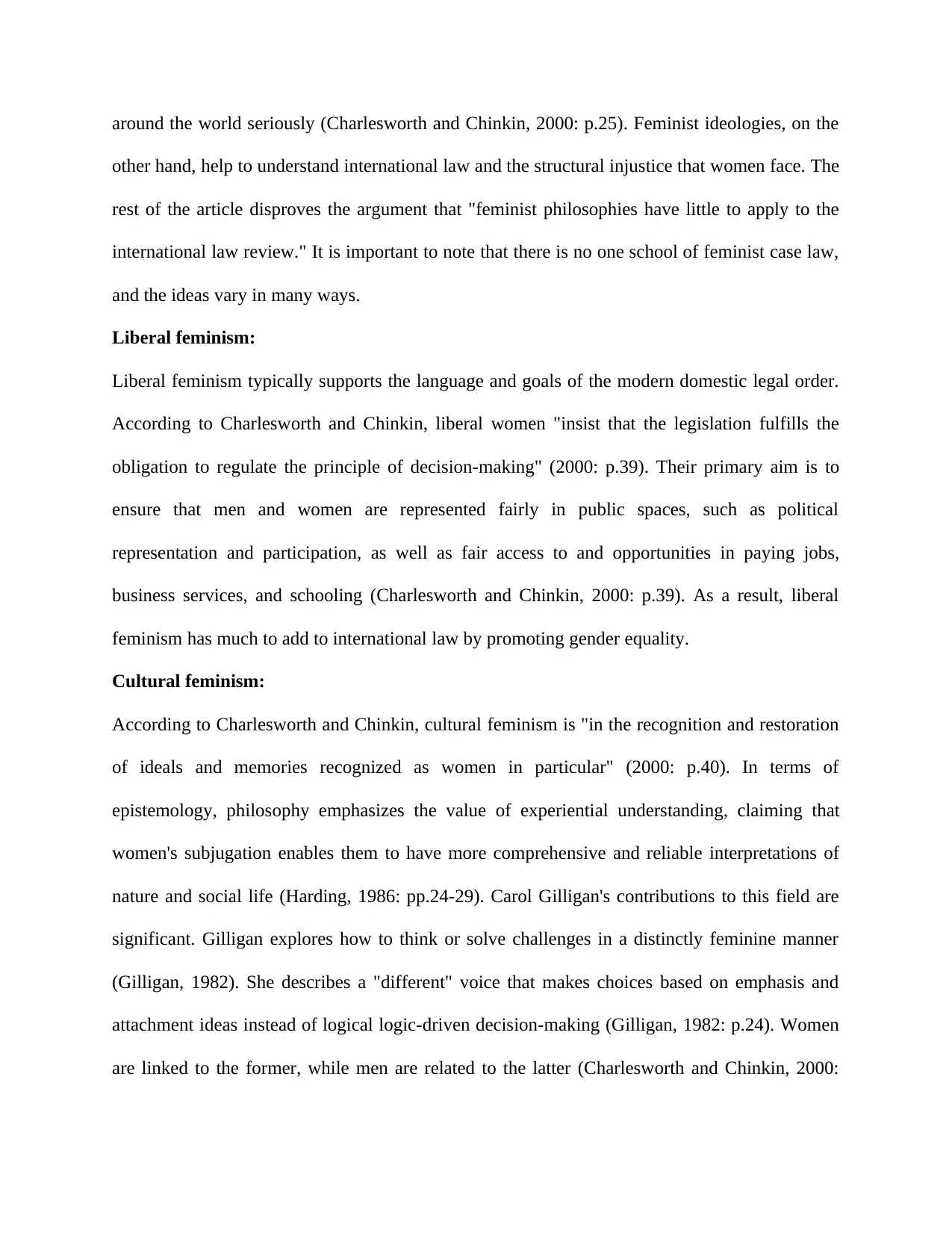
around the world seriously (Charlesworth and Chinkin, 2000: p.25). Feminist ideologies, on the
other hand, help to understand international law and the structural injustice that women face. The
rest of the article disproves the argument that "feminist philosophies have little to apply to the
international law review." It is important to note that there is no one school of feminist case law,
and the ideas vary in many ways.
Liberal feminism:
Liberal feminism typically supports the language and goals of the modern domestic legal order.
According to Charlesworth and Chinkin, liberal women "insist that the legislation fulfills the
obligation to regulate the principle of decision-making" (2000: p.39). Their primary aim is to
ensure that men and women are represented fairly in public spaces, such as political
representation and participation, as well as fair access to and opportunities in paying jobs,
business services, and schooling (Charlesworth and Chinkin, 2000: p.39). As a result, liberal
feminism has much to add to international law by promoting gender equality.
Cultural feminism:
According to Charlesworth and Chinkin, cultural feminism is "in the recognition and restoration
of ideals and memories recognized as women in particular" (2000: p.40). In terms of
epistemology, philosophy emphasizes the value of experiential understanding, claiming that
women's subjugation enables them to have more comprehensive and reliable interpretations of
nature and social life (Harding, 1986: pp.24-29). Carol Gilligan's contributions to this field are
significant. Gilligan explores how to think or solve challenges in a distinctly feminine manner
(Gilligan, 1982). She describes a "different" voice that makes choices based on emphasis and
attachment ideas instead of logical logic-driven decision-making (Gilligan, 1982: p.24). Women
are linked to the former, while men are related to the latter (Charlesworth and Chinkin, 2000:
other hand, help to understand international law and the structural injustice that women face. The
rest of the article disproves the argument that "feminist philosophies have little to apply to the
international law review." It is important to note that there is no one school of feminist case law,
and the ideas vary in many ways.
Liberal feminism:
Liberal feminism typically supports the language and goals of the modern domestic legal order.
According to Charlesworth and Chinkin, liberal women "insist that the legislation fulfills the
obligation to regulate the principle of decision-making" (2000: p.39). Their primary aim is to
ensure that men and women are represented fairly in public spaces, such as political
representation and participation, as well as fair access to and opportunities in paying jobs,
business services, and schooling (Charlesworth and Chinkin, 2000: p.39). As a result, liberal
feminism has much to add to international law by promoting gender equality.
Cultural feminism:
According to Charlesworth and Chinkin, cultural feminism is "in the recognition and restoration
of ideals and memories recognized as women in particular" (2000: p.40). In terms of
epistemology, philosophy emphasizes the value of experiential understanding, claiming that
women's subjugation enables them to have more comprehensive and reliable interpretations of
nature and social life (Harding, 1986: pp.24-29). Carol Gilligan's contributions to this field are
significant. Gilligan explores how to think or solve challenges in a distinctly feminine manner
(Gilligan, 1982). She describes a "different" voice that makes choices based on emphasis and
attachment ideas instead of logical logic-driven decision-making (Gilligan, 1982: p.24). Women
are linked to the former, while men are related to the latter (Charlesworth and Chinkin, 2000:
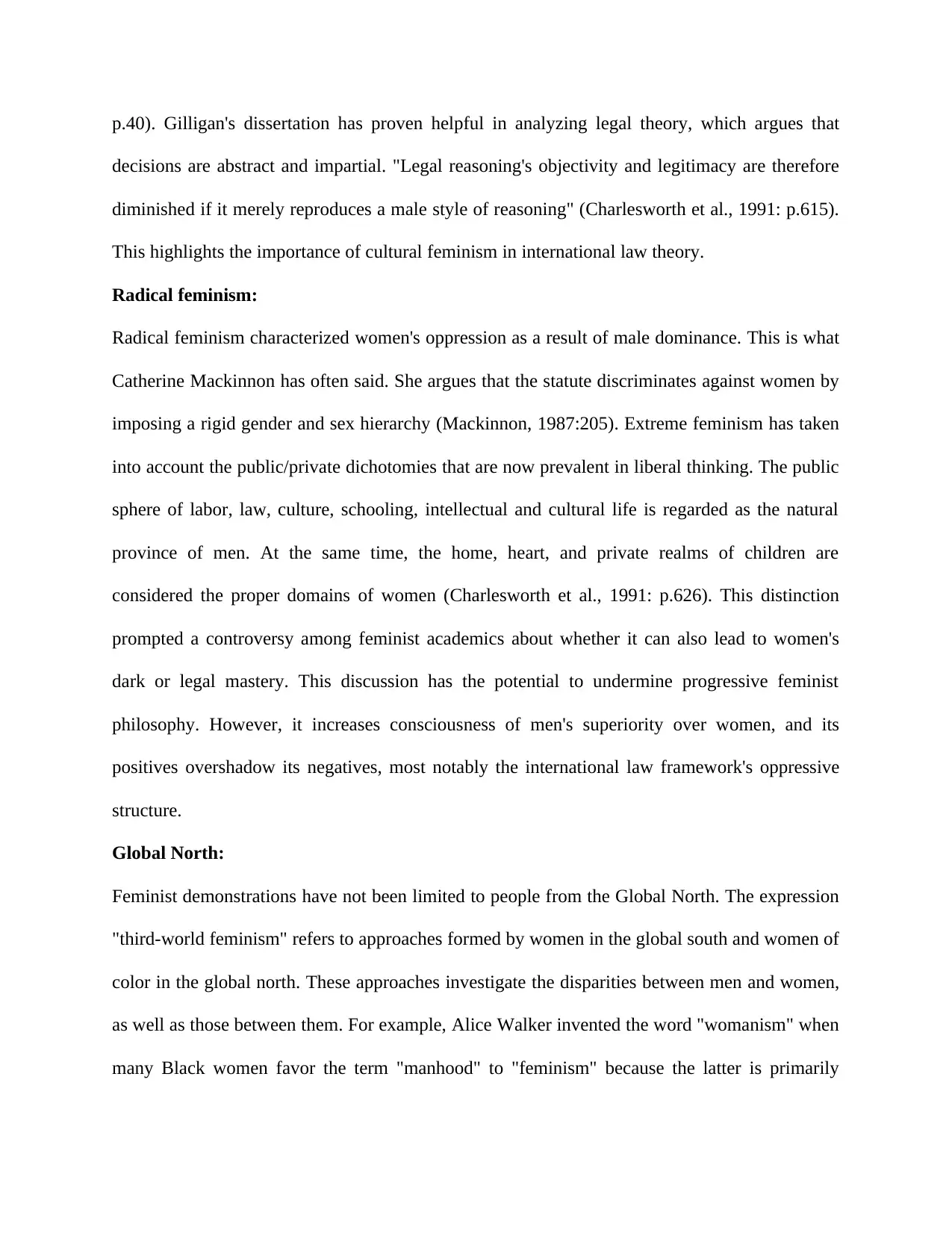
p.40). Gilligan's dissertation has proven helpful in analyzing legal theory, which argues that
decisions are abstract and impartial. "Legal reasoning's objectivity and legitimacy are therefore
diminished if it merely reproduces a male style of reasoning" (Charlesworth et al., 1991: p.615).
This highlights the importance of cultural feminism in international law theory.
Radical feminism:
Radical feminism characterized women's oppression as a result of male dominance. This is what
Catherine Mackinnon has often said. She argues that the statute discriminates against women by
imposing a rigid gender and sex hierarchy (Mackinnon, 1987:205). Extreme feminism has taken
into account the public/private dichotomies that are now prevalent in liberal thinking. The public
sphere of labor, law, culture, schooling, intellectual and cultural life is regarded as the natural
province of men. At the same time, the home, heart, and private realms of children are
considered the proper domains of women (Charlesworth et al., 1991: p.626). This distinction
prompted a controversy among feminist academics about whether it can also lead to women's
dark or legal mastery. This discussion has the potential to undermine progressive feminist
philosophy. However, it increases consciousness of men's superiority over women, and its
positives overshadow its negatives, most notably the international law framework's oppressive
structure.
Global North:
Feminist demonstrations have not been limited to people from the Global North. The expression
"third-world feminism" refers to approaches formed by women in the global south and women of
color in the global north. These approaches investigate the disparities between men and women,
as well as those between them. For example, Alice Walker invented the word "womanism" when
many Black women favor the term "manhood" to "feminism" because the latter is primarily
decisions are abstract and impartial. "Legal reasoning's objectivity and legitimacy are therefore
diminished if it merely reproduces a male style of reasoning" (Charlesworth et al., 1991: p.615).
This highlights the importance of cultural feminism in international law theory.
Radical feminism:
Radical feminism characterized women's oppression as a result of male dominance. This is what
Catherine Mackinnon has often said. She argues that the statute discriminates against women by
imposing a rigid gender and sex hierarchy (Mackinnon, 1987:205). Extreme feminism has taken
into account the public/private dichotomies that are now prevalent in liberal thinking. The public
sphere of labor, law, culture, schooling, intellectual and cultural life is regarded as the natural
province of men. At the same time, the home, heart, and private realms of children are
considered the proper domains of women (Charlesworth et al., 1991: p.626). This distinction
prompted a controversy among feminist academics about whether it can also lead to women's
dark or legal mastery. This discussion has the potential to undermine progressive feminist
philosophy. However, it increases consciousness of men's superiority over women, and its
positives overshadow its negatives, most notably the international law framework's oppressive
structure.
Global North:
Feminist demonstrations have not been limited to people from the Global North. The expression
"third-world feminism" refers to approaches formed by women in the global south and women of
color in the global north. These approaches investigate the disparities between men and women,
as well as those between them. For example, Alice Walker invented the word "womanism" when
many Black women favor the term "manhood" to "feminism" because the latter is primarily
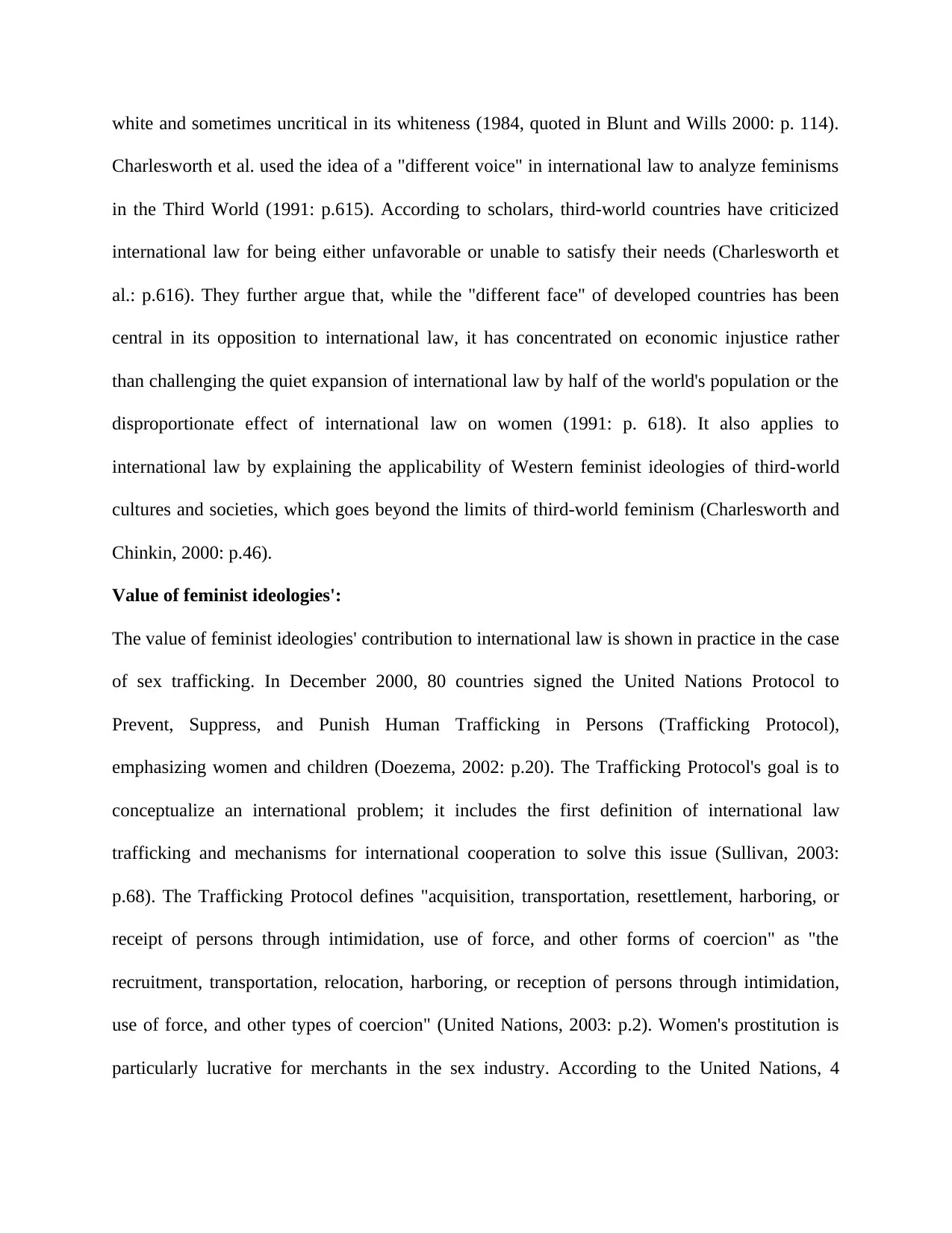
white and sometimes uncritical in its whiteness (1984, quoted in Blunt and Wills 2000: p. 114).
Charlesworth et al. used the idea of a "different voice" in international law to analyze feminisms
in the Third World (1991: p.615). According to scholars, third-world countries have criticized
international law for being either unfavorable or unable to satisfy their needs (Charlesworth et
al.: p.616). They further argue that, while the "different face" of developed countries has been
central in its opposition to international law, it has concentrated on economic injustice rather
than challenging the quiet expansion of international law by half of the world's population or the
disproportionate effect of international law on women (1991: p. 618). It also applies to
international law by explaining the applicability of Western feminist ideologies of third-world
cultures and societies, which goes beyond the limits of third-world feminism (Charlesworth and
Chinkin, 2000: p.46).
Value of feminist ideologies':
The value of feminist ideologies' contribution to international law is shown in practice in the case
of sex trafficking. In December 2000, 80 countries signed the United Nations Protocol to
Prevent, Suppress, and Punish Human Trafficking in Persons (Trafficking Protocol),
emphasizing women and children (Doezema, 2002: p.20). The Trafficking Protocol's goal is to
conceptualize an international problem; it includes the first definition of international law
trafficking and mechanisms for international cooperation to solve this issue (Sullivan, 2003:
p.68). The Trafficking Protocol defines "acquisition, transportation, resettlement, harboring, or
receipt of persons through intimidation, use of force, and other forms of coercion" as "the
recruitment, transportation, relocation, harboring, or reception of persons through intimidation,
use of force, and other types of coercion" (United Nations, 2003: p.2). Women's prostitution is
particularly lucrative for merchants in the sex industry. According to the United Nations, 4
Charlesworth et al. used the idea of a "different voice" in international law to analyze feminisms
in the Third World (1991: p.615). According to scholars, third-world countries have criticized
international law for being either unfavorable or unable to satisfy their needs (Charlesworth et
al.: p.616). They further argue that, while the "different face" of developed countries has been
central in its opposition to international law, it has concentrated on economic injustice rather
than challenging the quiet expansion of international law by half of the world's population or the
disproportionate effect of international law on women (1991: p. 618). It also applies to
international law by explaining the applicability of Western feminist ideologies of third-world
cultures and societies, which goes beyond the limits of third-world feminism (Charlesworth and
Chinkin, 2000: p.46).
Value of feminist ideologies':
The value of feminist ideologies' contribution to international law is shown in practice in the case
of sex trafficking. In December 2000, 80 countries signed the United Nations Protocol to
Prevent, Suppress, and Punish Human Trafficking in Persons (Trafficking Protocol),
emphasizing women and children (Doezema, 2002: p.20). The Trafficking Protocol's goal is to
conceptualize an international problem; it includes the first definition of international law
trafficking and mechanisms for international cooperation to solve this issue (Sullivan, 2003:
p.68). The Trafficking Protocol defines "acquisition, transportation, resettlement, harboring, or
receipt of persons through intimidation, use of force, and other forms of coercion" as "the
recruitment, transportation, relocation, harboring, or reception of persons through intimidation,
use of force, and other types of coercion" (United Nations, 2003: p.2). Women's prostitution is
particularly lucrative for merchants in the sex industry. According to the United Nations, 4
Secure Best Marks with AI Grader
Need help grading? Try our AI Grader for instant feedback on your assignments.
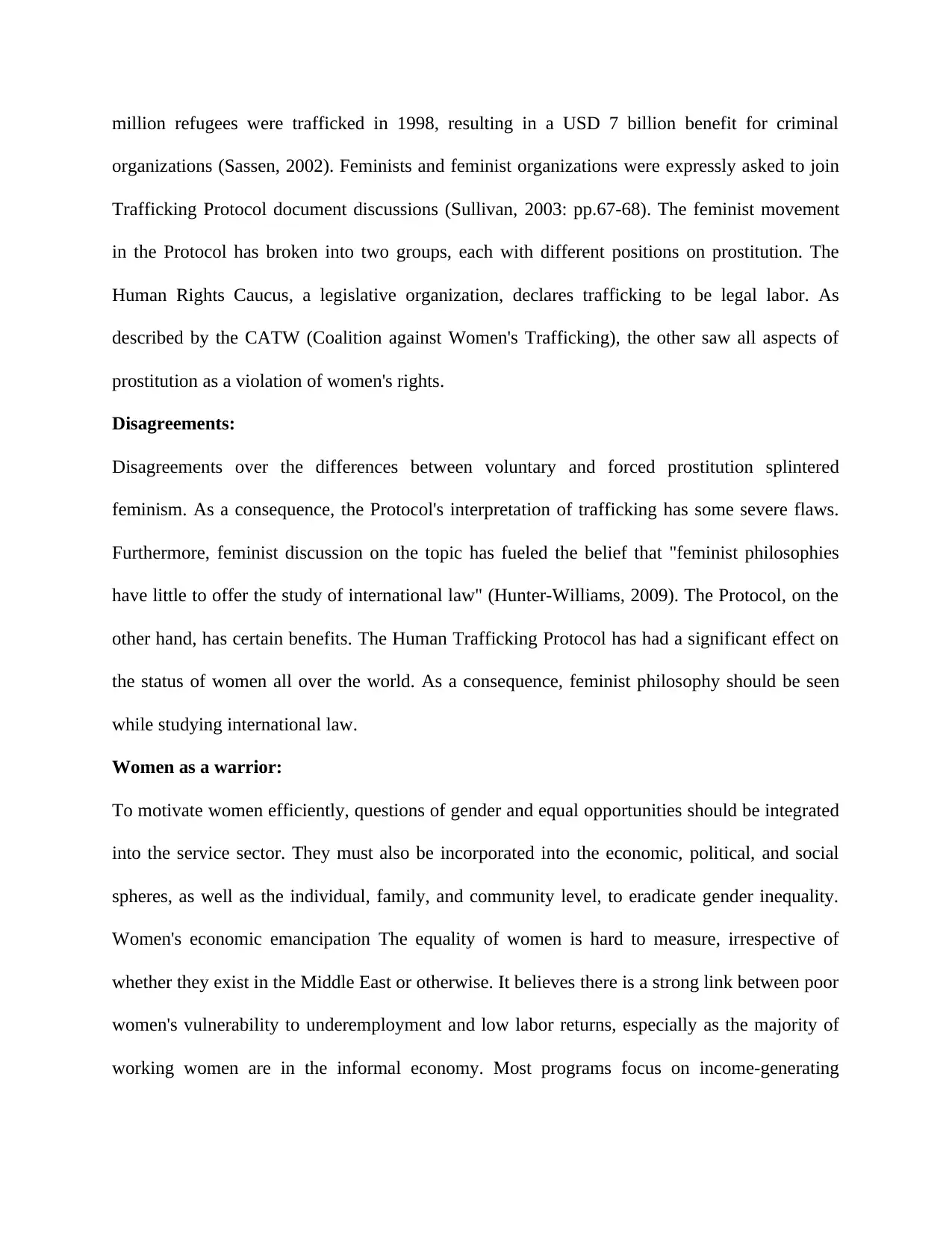
million refugees were trafficked in 1998, resulting in a USD 7 billion benefit for criminal
organizations (Sassen, 2002). Feminists and feminist organizations were expressly asked to join
Trafficking Protocol document discussions (Sullivan, 2003: pp.67-68). The feminist movement
in the Protocol has broken into two groups, each with different positions on prostitution. The
Human Rights Caucus, a legislative organization, declares trafficking to be legal labor. As
described by the CATW (Coalition against Women's Trafficking), the other saw all aspects of
prostitution as a violation of women's rights.
Disagreements:
Disagreements over the differences between voluntary and forced prostitution splintered
feminism. As a consequence, the Protocol's interpretation of trafficking has some severe flaws.
Furthermore, feminist discussion on the topic has fueled the belief that "feminist philosophies
have little to offer the study of international law" (Hunter-Williams, 2009). The Protocol, on the
other hand, has certain benefits. The Human Trafficking Protocol has had a significant effect on
the status of women all over the world. As a consequence, feminist philosophy should be seen
while studying international law.
Women as a warrior:
To motivate women efficiently, questions of gender and equal opportunities should be integrated
into the service sector. They must also be incorporated into the economic, political, and social
spheres, as well as the individual, family, and community level, to eradicate gender inequality.
Women's economic emancipation The equality of women is hard to measure, irrespective of
whether they exist in the Middle East or otherwise. It believes there is a strong link between poor
women's vulnerability to underemployment and low labor returns, especially as the majority of
working women are in the informal economy. Most programs focus on income-generating
organizations (Sassen, 2002). Feminists and feminist organizations were expressly asked to join
Trafficking Protocol document discussions (Sullivan, 2003: pp.67-68). The feminist movement
in the Protocol has broken into two groups, each with different positions on prostitution. The
Human Rights Caucus, a legislative organization, declares trafficking to be legal labor. As
described by the CATW (Coalition against Women's Trafficking), the other saw all aspects of
prostitution as a violation of women's rights.
Disagreements:
Disagreements over the differences between voluntary and forced prostitution splintered
feminism. As a consequence, the Protocol's interpretation of trafficking has some severe flaws.
Furthermore, feminist discussion on the topic has fueled the belief that "feminist philosophies
have little to offer the study of international law" (Hunter-Williams, 2009). The Protocol, on the
other hand, has certain benefits. The Human Trafficking Protocol has had a significant effect on
the status of women all over the world. As a consequence, feminist philosophy should be seen
while studying international law.
Women as a warrior:
To motivate women efficiently, questions of gender and equal opportunities should be integrated
into the service sector. They must also be incorporated into the economic, political, and social
spheres, as well as the individual, family, and community level, to eradicate gender inequality.
Women's economic emancipation The equality of women is hard to measure, irrespective of
whether they exist in the Middle East or otherwise. It believes there is a strong link between poor
women's vulnerability to underemployment and low labor returns, especially as the majority of
working women are in the informal economy. Most programs focus on income-generating
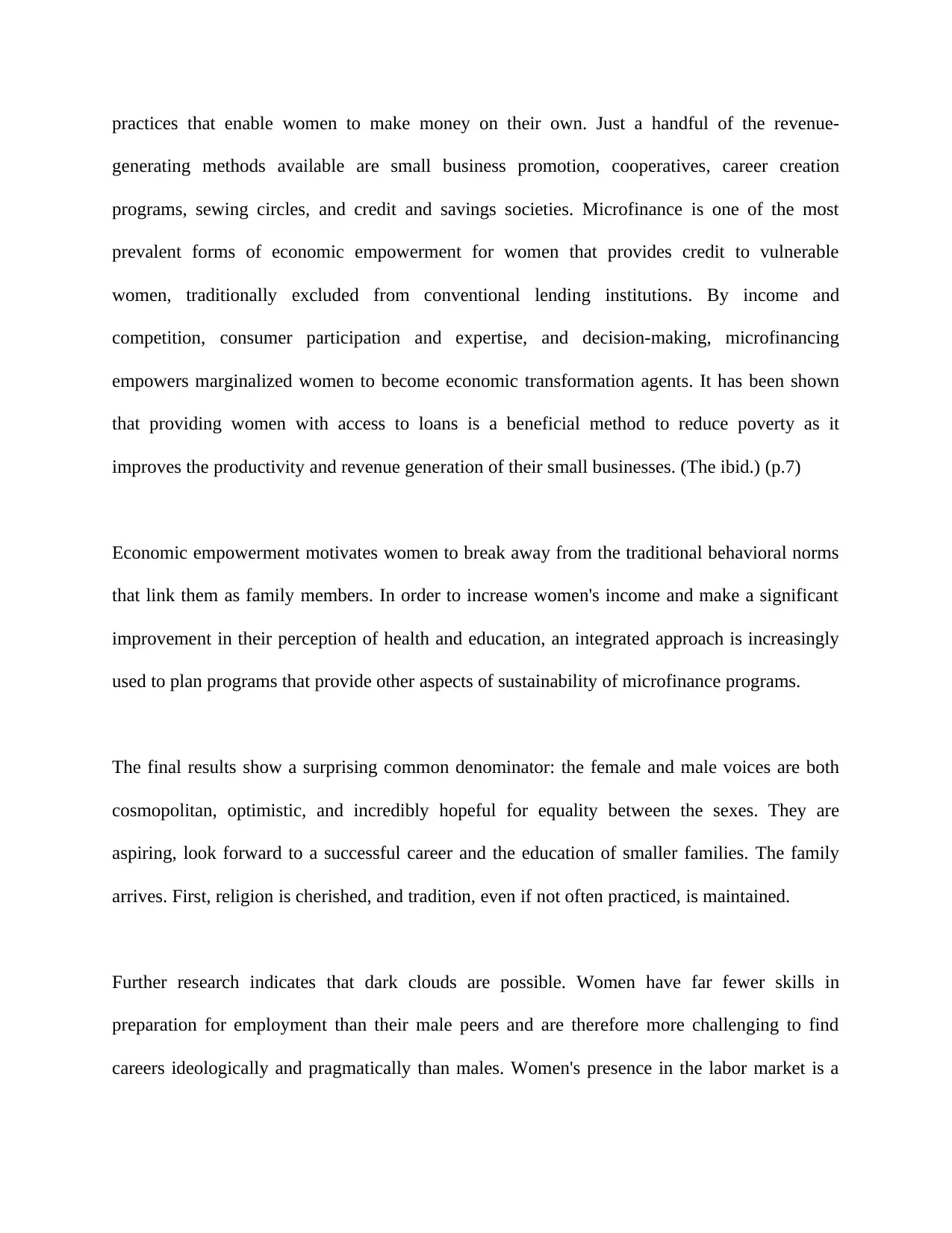
practices that enable women to make money on their own. Just a handful of the revenue-
generating methods available are small business promotion, cooperatives, career creation
programs, sewing circles, and credit and savings societies. Microfinance is one of the most
prevalent forms of economic empowerment for women that provides credit to vulnerable
women, traditionally excluded from conventional lending institutions. By income and
competition, consumer participation and expertise, and decision-making, microfinancing
empowers marginalized women to become economic transformation agents. It has been shown
that providing women with access to loans is a beneficial method to reduce poverty as it
improves the productivity and revenue generation of their small businesses. (The ibid.) (p.7)
Economic empowerment motivates women to break away from the traditional behavioral norms
that link them as family members. In order to increase women's income and make a significant
improvement in their perception of health and education, an integrated approach is increasingly
used to plan programs that provide other aspects of sustainability of microfinance programs.
The final results show a surprising common denominator: the female and male voices are both
cosmopolitan, optimistic, and incredibly hopeful for equality between the sexes. They are
aspiring, look forward to a successful career and the education of smaller families. The family
arrives. First, religion is cherished, and tradition, even if not often practiced, is maintained.
Further research indicates that dark clouds are possible. Women have far fewer skills in
preparation for employment than their male peers and are therefore more challenging to find
careers ideologically and pragmatically than males. Women's presence in the labor market is a
generating methods available are small business promotion, cooperatives, career creation
programs, sewing circles, and credit and savings societies. Microfinance is one of the most
prevalent forms of economic empowerment for women that provides credit to vulnerable
women, traditionally excluded from conventional lending institutions. By income and
competition, consumer participation and expertise, and decision-making, microfinancing
empowers marginalized women to become economic transformation agents. It has been shown
that providing women with access to loans is a beneficial method to reduce poverty as it
improves the productivity and revenue generation of their small businesses. (The ibid.) (p.7)
Economic empowerment motivates women to break away from the traditional behavioral norms
that link them as family members. In order to increase women's income and make a significant
improvement in their perception of health and education, an integrated approach is increasingly
used to plan programs that provide other aspects of sustainability of microfinance programs.
The final results show a surprising common denominator: the female and male voices are both
cosmopolitan, optimistic, and incredibly hopeful for equality between the sexes. They are
aspiring, look forward to a successful career and the education of smaller families. The family
arrives. First, religion is cherished, and tradition, even if not often practiced, is maintained.
Further research indicates that dark clouds are possible. Women have far fewer skills in
preparation for employment than their male peers and are therefore more challenging to find
careers ideologically and pragmatically than males. Women's presence in the labor market is a
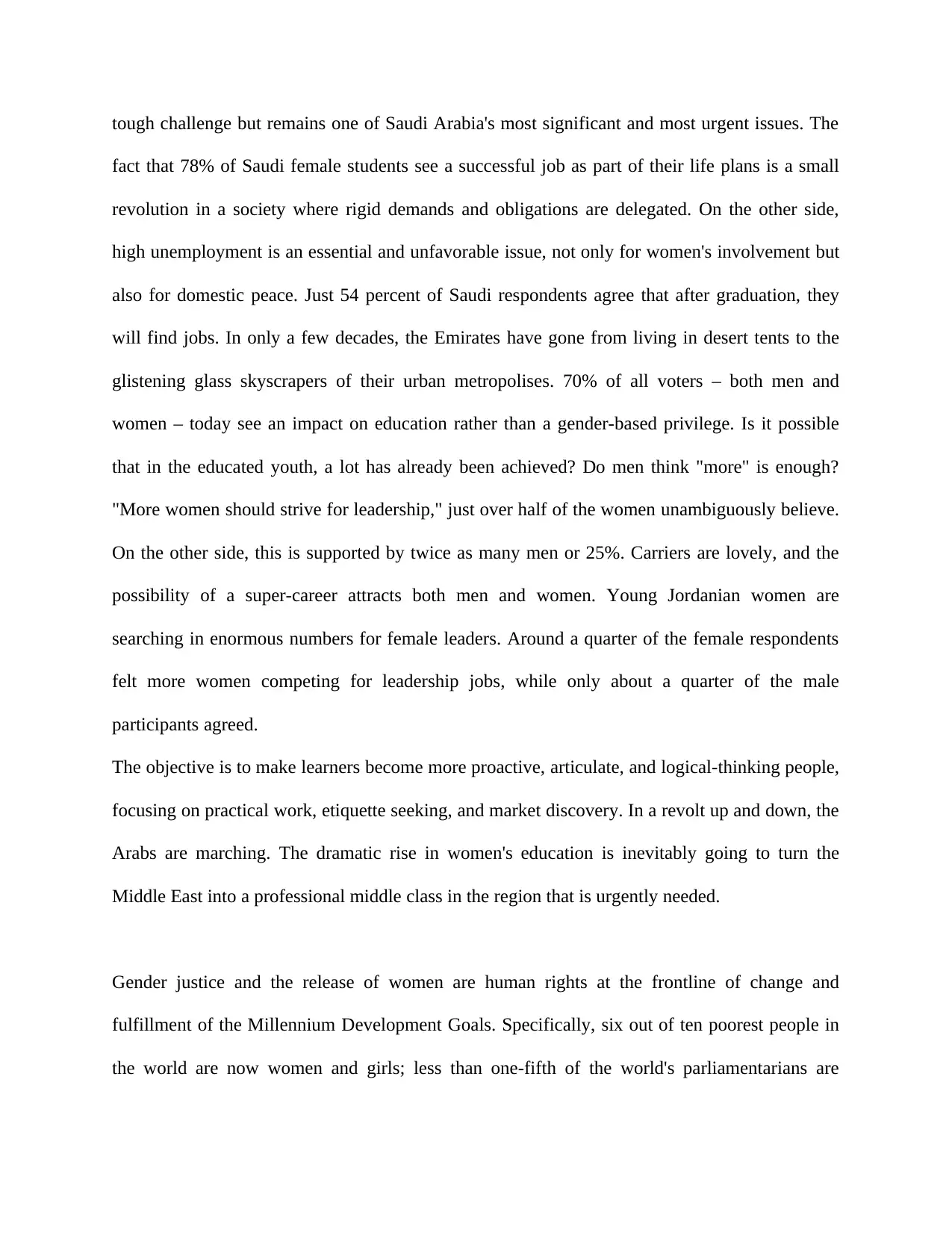
tough challenge but remains one of Saudi Arabia's most significant and most urgent issues. The
fact that 78% of Saudi female students see a successful job as part of their life plans is a small
revolution in a society where rigid demands and obligations are delegated. On the other side,
high unemployment is an essential and unfavorable issue, not only for women's involvement but
also for domestic peace. Just 54 percent of Saudi respondents agree that after graduation, they
will find jobs. In only a few decades, the Emirates have gone from living in desert tents to the
glistening glass skyscrapers of their urban metropolises. 70% of all voters – both men and
women – today see an impact on education rather than a gender-based privilege. Is it possible
that in the educated youth, a lot has already been achieved? Do men think "more" is enough?
"More women should strive for leadership," just over half of the women unambiguously believe.
On the other side, this is supported by twice as many men or 25%. Carriers are lovely, and the
possibility of a super-career attracts both men and women. Young Jordanian women are
searching in enormous numbers for female leaders. Around a quarter of the female respondents
felt more women competing for leadership jobs, while only about a quarter of the male
participants agreed.
The objective is to make learners become more proactive, articulate, and logical-thinking people,
focusing on practical work, etiquette seeking, and market discovery. In a revolt up and down, the
Arabs are marching. The dramatic rise in women's education is inevitably going to turn the
Middle East into a professional middle class in the region that is urgently needed.
Gender justice and the release of women are human rights at the frontline of change and
fulfillment of the Millennium Development Goals. Specifically, six out of ten poorest people in
the world are now women and girls; less than one-fifth of the world's parliamentarians are
fact that 78% of Saudi female students see a successful job as part of their life plans is a small
revolution in a society where rigid demands and obligations are delegated. On the other side,
high unemployment is an essential and unfavorable issue, not only for women's involvement but
also for domestic peace. Just 54 percent of Saudi respondents agree that after graduation, they
will find jobs. In only a few decades, the Emirates have gone from living in desert tents to the
glistening glass skyscrapers of their urban metropolises. 70% of all voters – both men and
women – today see an impact on education rather than a gender-based privilege. Is it possible
that in the educated youth, a lot has already been achieved? Do men think "more" is enough?
"More women should strive for leadership," just over half of the women unambiguously believe.
On the other side, this is supported by twice as many men or 25%. Carriers are lovely, and the
possibility of a super-career attracts both men and women. Young Jordanian women are
searching in enormous numbers for female leaders. Around a quarter of the female respondents
felt more women competing for leadership jobs, while only about a quarter of the male
participants agreed.
The objective is to make learners become more proactive, articulate, and logical-thinking people,
focusing on practical work, etiquette seeking, and market discovery. In a revolt up and down, the
Arabs are marching. The dramatic rise in women's education is inevitably going to turn the
Middle East into a professional middle class in the region that is urgently needed.
Gender justice and the release of women are human rights at the frontline of change and
fulfillment of the Millennium Development Goals. Specifically, six out of ten poorest people in
the world are now women and girls; less than one-fifth of the world's parliamentarians are
Paraphrase This Document
Need a fresh take? Get an instant paraphrase of this document with our AI Paraphraser
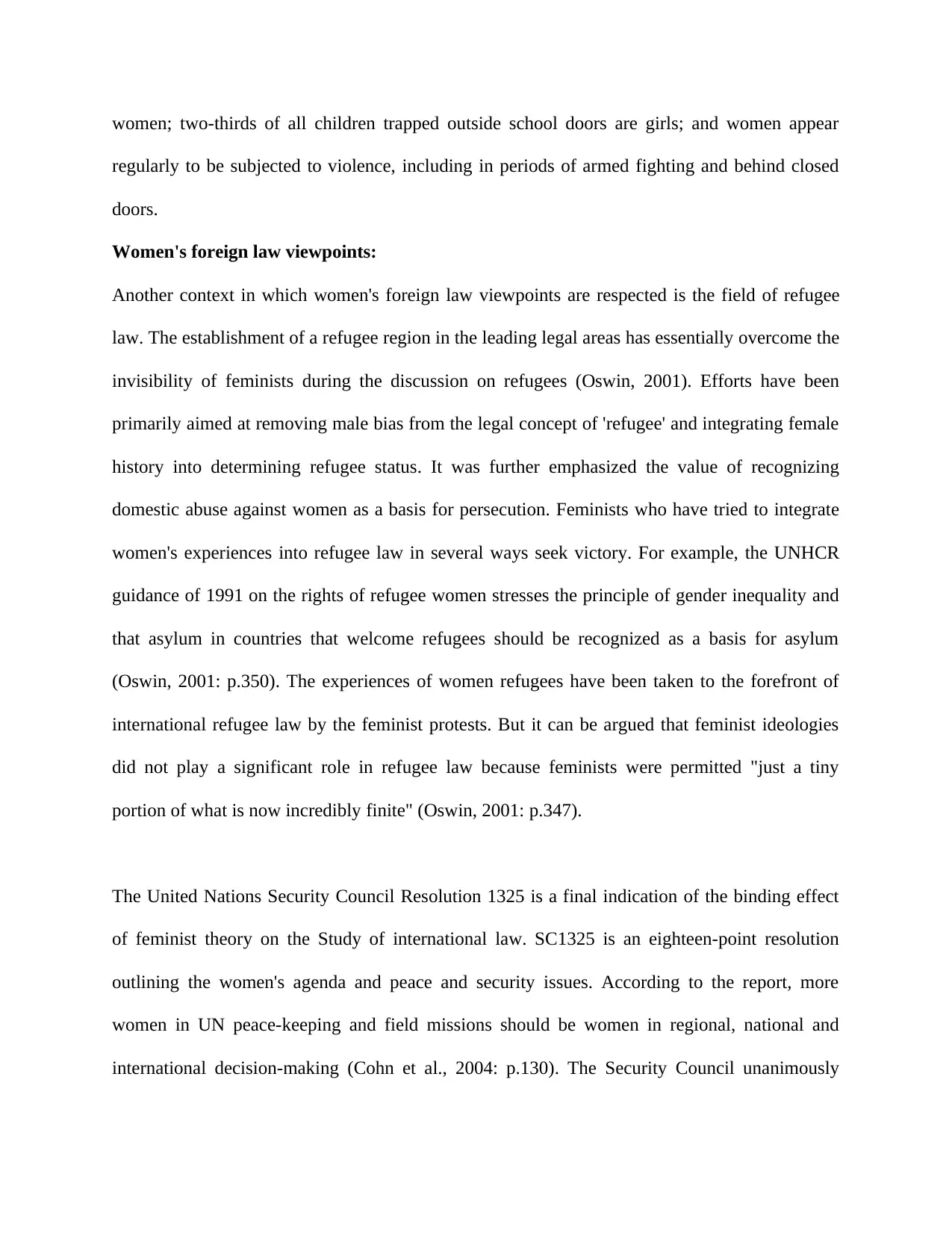
women; two-thirds of all children trapped outside school doors are girls; and women appear
regularly to be subjected to violence, including in periods of armed fighting and behind closed
doors.
Women's foreign law viewpoints:
Another context in which women's foreign law viewpoints are respected is the field of refugee
law. The establishment of a refugee region in the leading legal areas has essentially overcome the
invisibility of feminists during the discussion on refugees (Oswin, 2001). Efforts have been
primarily aimed at removing male bias from the legal concept of 'refugee' and integrating female
history into determining refugee status. It was further emphasized the value of recognizing
domestic abuse against women as a basis for persecution. Feminists who have tried to integrate
women's experiences into refugee law in several ways seek victory. For example, the UNHCR
guidance of 1991 on the rights of refugee women stresses the principle of gender inequality and
that asylum in countries that welcome refugees should be recognized as a basis for asylum
(Oswin, 2001: p.350). The experiences of women refugees have been taken to the forefront of
international refugee law by the feminist protests. But it can be argued that feminist ideologies
did not play a significant role in refugee law because feminists were permitted "just a tiny
portion of what is now incredibly finite" (Oswin, 2001: p.347).
The United Nations Security Council Resolution 1325 is a final indication of the binding effect
of feminist theory on the Study of international law. SC1325 is an eighteen-point resolution
outlining the women's agenda and peace and security issues. According to the report, more
women in UN peace-keeping and field missions should be women in regional, national and
international decision-making (Cohn et al., 2004: p.130). The Security Council unanimously
regularly to be subjected to violence, including in periods of armed fighting and behind closed
doors.
Women's foreign law viewpoints:
Another context in which women's foreign law viewpoints are respected is the field of refugee
law. The establishment of a refugee region in the leading legal areas has essentially overcome the
invisibility of feminists during the discussion on refugees (Oswin, 2001). Efforts have been
primarily aimed at removing male bias from the legal concept of 'refugee' and integrating female
history into determining refugee status. It was further emphasized the value of recognizing
domestic abuse against women as a basis for persecution. Feminists who have tried to integrate
women's experiences into refugee law in several ways seek victory. For example, the UNHCR
guidance of 1991 on the rights of refugee women stresses the principle of gender inequality and
that asylum in countries that welcome refugees should be recognized as a basis for asylum
(Oswin, 2001: p.350). The experiences of women refugees have been taken to the forefront of
international refugee law by the feminist protests. But it can be argued that feminist ideologies
did not play a significant role in refugee law because feminists were permitted "just a tiny
portion of what is now incredibly finite" (Oswin, 2001: p.347).
The United Nations Security Council Resolution 1325 is a final indication of the binding effect
of feminist theory on the Study of international law. SC1325 is an eighteen-point resolution
outlining the women's agenda and peace and security issues. According to the report, more
women in UN peace-keeping and field missions should be women in regional, national and
international decision-making (Cohn et al., 2004: p.130). The Security Council unanimously
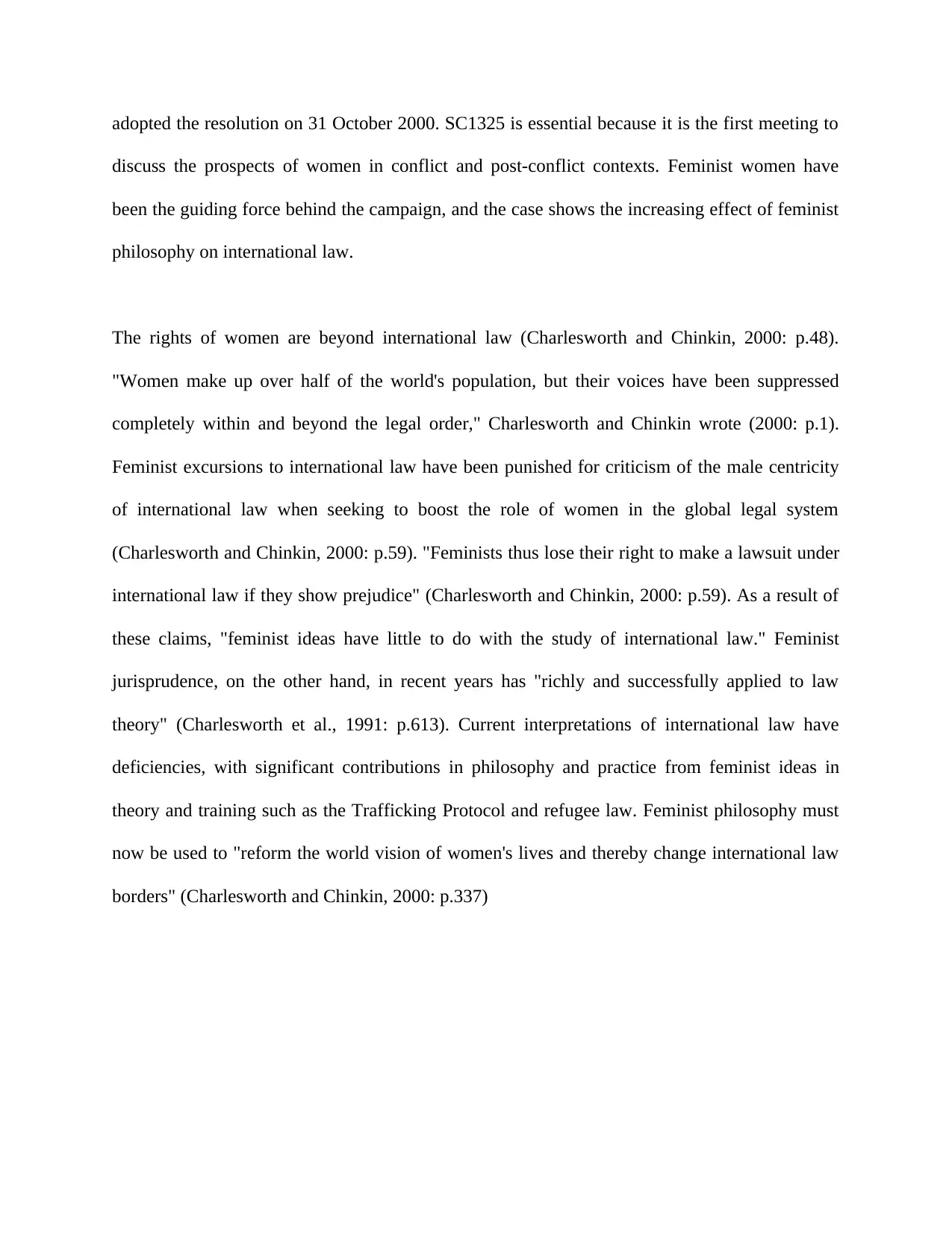
adopted the resolution on 31 October 2000. SC1325 is essential because it is the first meeting to
discuss the prospects of women in conflict and post-conflict contexts. Feminist women have
been the guiding force behind the campaign, and the case shows the increasing effect of feminist
philosophy on international law.
The rights of women are beyond international law (Charlesworth and Chinkin, 2000: p.48).
"Women make up over half of the world's population, but their voices have been suppressed
completely within and beyond the legal order," Charlesworth and Chinkin wrote (2000: p.1).
Feminist excursions to international law have been punished for criticism of the male centricity
of international law when seeking to boost the role of women in the global legal system
(Charlesworth and Chinkin, 2000: p.59). "Feminists thus lose their right to make a lawsuit under
international law if they show prejudice" (Charlesworth and Chinkin, 2000: p.59). As a result of
these claims, "feminist ideas have little to do with the study of international law." Feminist
jurisprudence, on the other hand, in recent years has "richly and successfully applied to law
theory" (Charlesworth et al., 1991: p.613). Current interpretations of international law have
deficiencies, with significant contributions in philosophy and practice from feminist ideas in
theory and training such as the Trafficking Protocol and refugee law. Feminist philosophy must
now be used to "reform the world vision of women's lives and thereby change international law
borders" (Charlesworth and Chinkin, 2000: p.337)
discuss the prospects of women in conflict and post-conflict contexts. Feminist women have
been the guiding force behind the campaign, and the case shows the increasing effect of feminist
philosophy on international law.
The rights of women are beyond international law (Charlesworth and Chinkin, 2000: p.48).
"Women make up over half of the world's population, but their voices have been suppressed
completely within and beyond the legal order," Charlesworth and Chinkin wrote (2000: p.1).
Feminist excursions to international law have been punished for criticism of the male centricity
of international law when seeking to boost the role of women in the global legal system
(Charlesworth and Chinkin, 2000: p.59). "Feminists thus lose their right to make a lawsuit under
international law if they show prejudice" (Charlesworth and Chinkin, 2000: p.59). As a result of
these claims, "feminist ideas have little to do with the study of international law." Feminist
jurisprudence, on the other hand, in recent years has "richly and successfully applied to law
theory" (Charlesworth et al., 1991: p.613). Current interpretations of international law have
deficiencies, with significant contributions in philosophy and practice from feminist ideas in
theory and training such as the Trafficking Protocol and refugee law. Feminist philosophy must
now be used to "reform the world vision of women's lives and thereby change international law
borders" (Charlesworth and Chinkin, 2000: p.337)
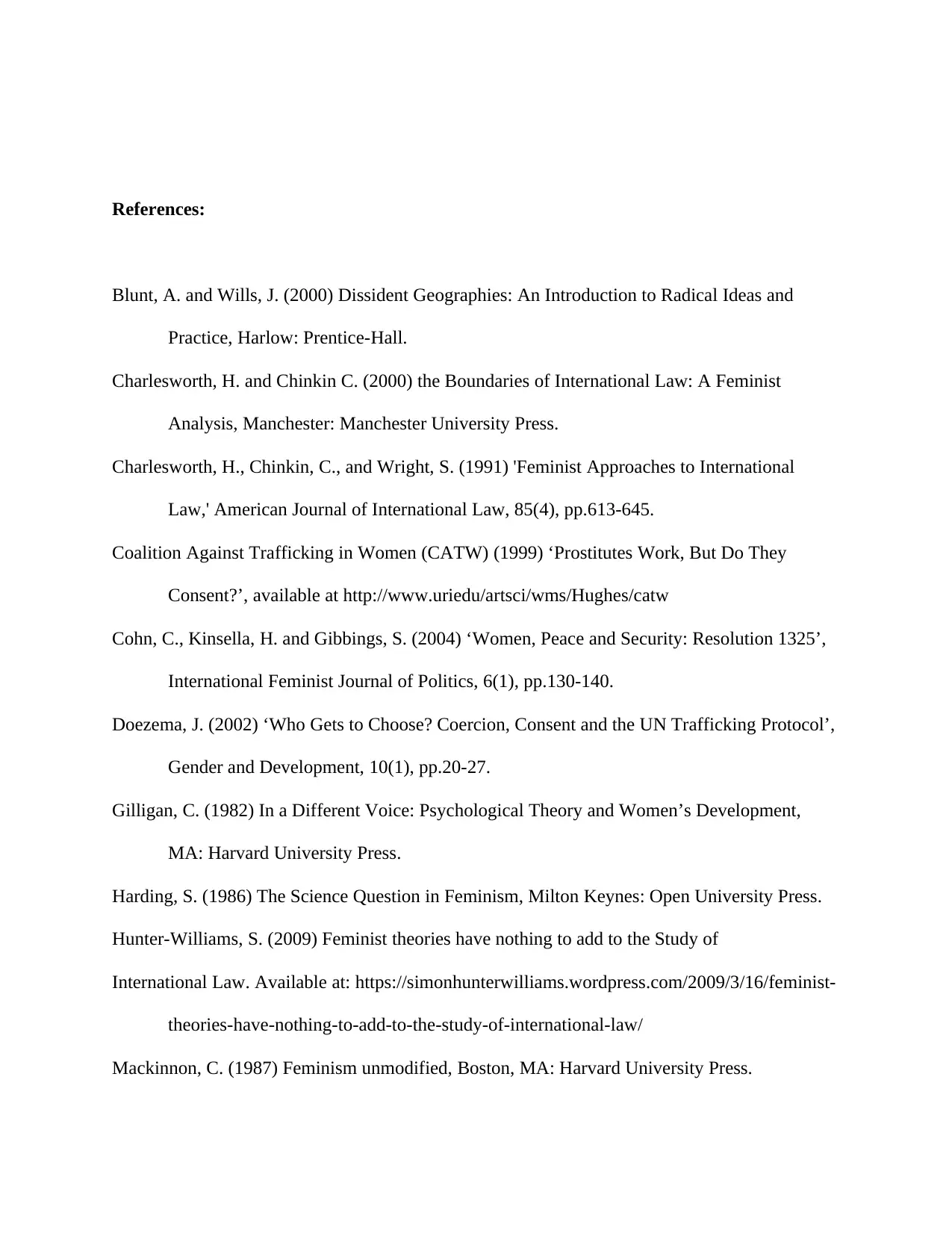
References:
Blunt, A. and Wills, J. (2000) Dissident Geographies: An Introduction to Radical Ideas and
Practice, Harlow: Prentice-Hall.
Charlesworth, H. and Chinkin C. (2000) the Boundaries of International Law: A Feminist
Analysis, Manchester: Manchester University Press.
Charlesworth, H., Chinkin, C., and Wright, S. (1991) 'Feminist Approaches to International
Law,' American Journal of International Law, 85(4), pp.613-645.
Coalition Against Trafficking in Women (CATW) (1999) ‘Prostitutes Work, But Do They
Consent?’, available at http://www.uriedu/artsci/wms/Hughes/catw
Cohn, C., Kinsella, H. and Gibbings, S. (2004) ‘Women, Peace and Security: Resolution 1325’,
International Feminist Journal of Politics, 6(1), pp.130-140.
Doezema, J. (2002) ‘Who Gets to Choose? Coercion, Consent and the UN Trafficking Protocol’,
Gender and Development, 10(1), pp.20-27.
Gilligan, C. (1982) In a Different Voice: Psychological Theory and Women’s Development,
MA: Harvard University Press.
Harding, S. (1986) The Science Question in Feminism, Milton Keynes: Open University Press.
Hunter-Williams, S. (2009) Feminist theories have nothing to add to the Study of
International Law. Available at: https://simonhunterwilliams.wordpress.com/2009/3/16/feminist-
theories-have-nothing-to-add-to-the-study-of-international-law/
Mackinnon, C. (1987) Feminism unmodified, Boston, MA: Harvard University Press.
Blunt, A. and Wills, J. (2000) Dissident Geographies: An Introduction to Radical Ideas and
Practice, Harlow: Prentice-Hall.
Charlesworth, H. and Chinkin C. (2000) the Boundaries of International Law: A Feminist
Analysis, Manchester: Manchester University Press.
Charlesworth, H., Chinkin, C., and Wright, S. (1991) 'Feminist Approaches to International
Law,' American Journal of International Law, 85(4), pp.613-645.
Coalition Against Trafficking in Women (CATW) (1999) ‘Prostitutes Work, But Do They
Consent?’, available at http://www.uriedu/artsci/wms/Hughes/catw
Cohn, C., Kinsella, H. and Gibbings, S. (2004) ‘Women, Peace and Security: Resolution 1325’,
International Feminist Journal of Politics, 6(1), pp.130-140.
Doezema, J. (2002) ‘Who Gets to Choose? Coercion, Consent and the UN Trafficking Protocol’,
Gender and Development, 10(1), pp.20-27.
Gilligan, C. (1982) In a Different Voice: Psychological Theory and Women’s Development,
MA: Harvard University Press.
Harding, S. (1986) The Science Question in Feminism, Milton Keynes: Open University Press.
Hunter-Williams, S. (2009) Feminist theories have nothing to add to the Study of
International Law. Available at: https://simonhunterwilliams.wordpress.com/2009/3/16/feminist-
theories-have-nothing-to-add-to-the-study-of-international-law/
Mackinnon, C. (1987) Feminism unmodified, Boston, MA: Harvard University Press.
Secure Best Marks with AI Grader
Need help grading? Try our AI Grader for instant feedback on your assignments.
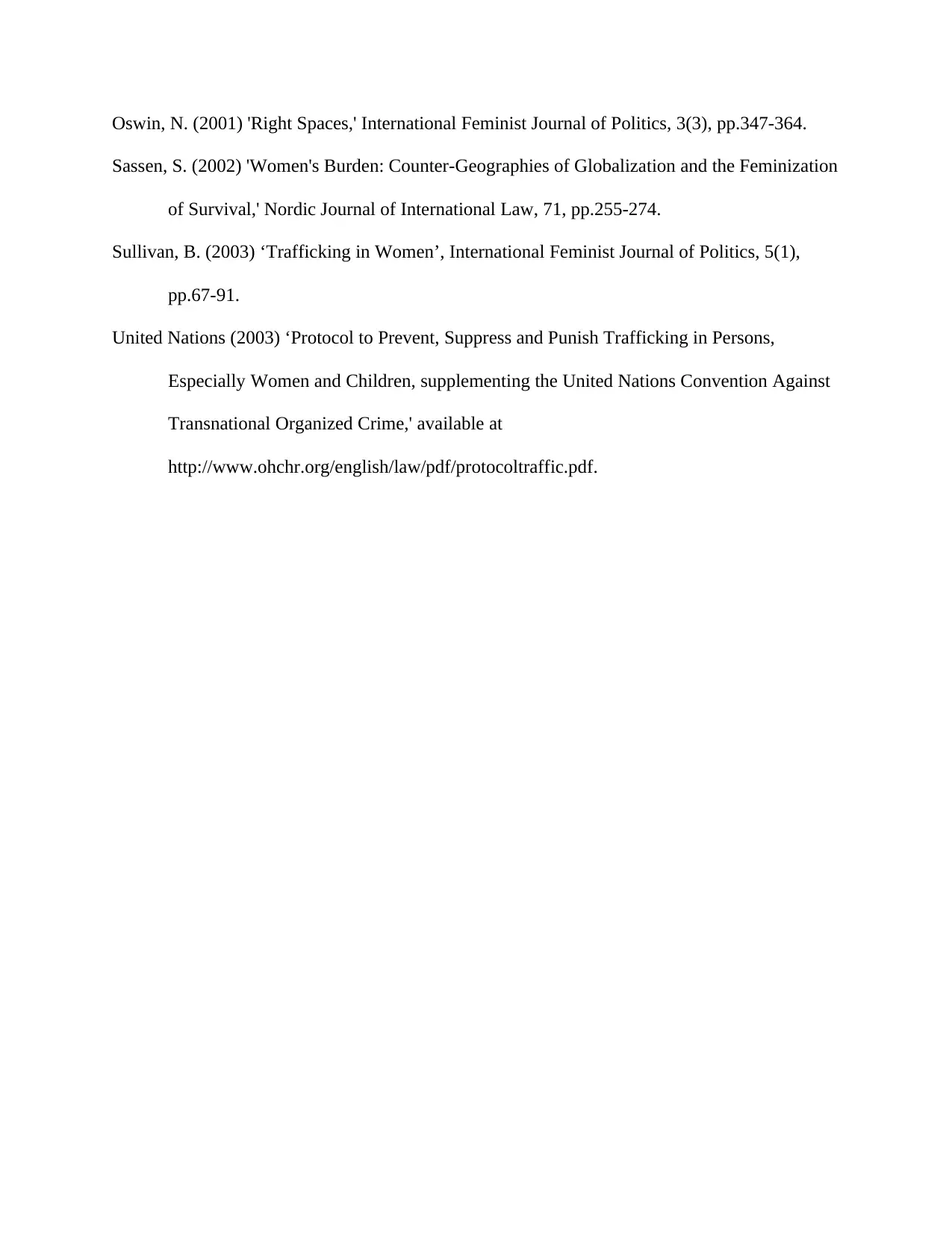
Oswin, N. (2001) 'Right Spaces,' International Feminist Journal of Politics, 3(3), pp.347-364.
Sassen, S. (2002) 'Women's Burden: Counter-Geographies of Globalization and the Feminization
of Survival,' Nordic Journal of International Law, 71, pp.255-274.
Sullivan, B. (2003) ‘Trafficking in Women’, International Feminist Journal of Politics, 5(1),
pp.67-91.
United Nations (2003) ‘Protocol to Prevent, Suppress and Punish Trafficking in Persons,
Especially Women and Children, supplementing the United Nations Convention Against
Transnational Organized Crime,' available at
http://www.ohchr.org/english/law/pdf/protocoltraffic.pdf.
Sassen, S. (2002) 'Women's Burden: Counter-Geographies of Globalization and the Feminization
of Survival,' Nordic Journal of International Law, 71, pp.255-274.
Sullivan, B. (2003) ‘Trafficking in Women’, International Feminist Journal of Politics, 5(1),
pp.67-91.
United Nations (2003) ‘Protocol to Prevent, Suppress and Punish Trafficking in Persons,
Especially Women and Children, supplementing the United Nations Convention Against
Transnational Organized Crime,' available at
http://www.ohchr.org/english/law/pdf/protocoltraffic.pdf.
1 out of 11
Your All-in-One AI-Powered Toolkit for Academic Success.
+13062052269
info@desklib.com
Available 24*7 on WhatsApp / Email
![[object Object]](/_next/static/media/star-bottom.7253800d.svg)
Unlock your academic potential
© 2024 | Zucol Services PVT LTD | All rights reserved.


